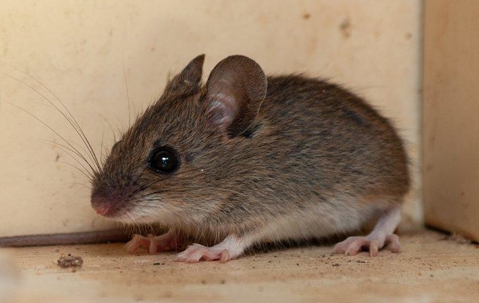Home defense is a necessity. Since our house is our fortress and our place of comfort, we don’t allow anything in that we haven’t welcomed in ourselves. But how can we defend against a natural-born home invader? The more you learn about mice, the more you’ll realize how easily they can get into your house. So… what’s making them so desperate to get in?
Well-Equipped For The Job
The mice that invade Davenport homes are typically light grey or light brown in color, with even lighter underbellies. As some of the smallest rodents in the world, they only measure up to three inches long, not including the tail. However, they do have something in common with all other rodents: their sharp teeth. With constantly growing front incisor teeth, mice have the capability (and the constant desire) to chew through almost anything.
With these sharp teeth and small, flexible bodies, mice can widen almost any gap in the side of your home to be able to squeeze through and invade your home. Once they’re in, they’ll chew through a variety of materials inside the house like AC ducts, electrical wiring, stored items, linens, laundry, shoes, and more. Mice are one of the most common home invaders out of any species of rodent. And, unfortunately, they’re also one of the most dangerous.
Along with the risk of home damage, mice pose a large threat to your health. When they’re not invading homes, they love to hang out in contaminated areas like landfills and dumpsters searching for leftover food. They’ll pick up dangerous bacteria at these locations and then bring it into your home, putting you at risk of incurring harmful sicknesses.
Limiting The Attractions
If mice are desperate enough to search through landfills and dumpsters for food, then what makes you think they won’t search through your home as well? While you might not be able to prevent them very easily, there are a few things you can do to limit their attraction to your home:
Store your food and trash properly. Make sure that all food and trash is stored in tightly secured containers that mice can’t chew through. Also, don’t leave food lying around for too long without storing it. And make sure your outdoor trashcans have heavy lids on them.
Limit their sources of food. Focus on the yard first. If you have outdoor pet food or birdseed, make sure it is properly stored where mice cannot get it. Also, pick up any fruit that might fall off of trees in the yard.
Seal up cracks and crevices. While mice can chew through a variety of siding material, they will usually lose interest if they can’t find a potential entry point quickly. If you spot holes or cracks that mice could chew open and squeeze through, try stuffing them with steel wool.
If you do spot mice in your home or notice that some of your items have holes chewed in them, don’t make the mistake of trying to eradicate an infestation yourself. Mice are incredibly prolific, so using traps and/or poison is usually ineffective. While you may be able to get rid of a few, there could be a dozen more within your walls in a matter of days. Plus, these traps and poisons put children and pets at risk. The safest and quickest way to get rid of a mouse infestation (and to keep it gone) is to enlist professional help. Call Quik-Kill Pest Eliminators and say goodbye to mice forever.

